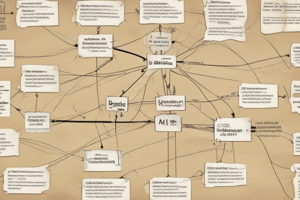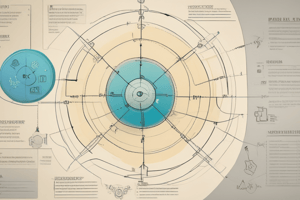Podcast
Questions and Answers
What does project scope refer to?
What does project scope refer to?
- Project stakeholders and customers
- Project costs and activities only
- Project objectives and deliverables only
- Project objectives, deliverables, activities, and costs (correct)
Why is a well-defined project scope crucial?
Why is a well-defined project scope crucial?
- To guide decision-making throughout the project lifecycle (correct)
- To reduce decision-making
- To increase project duration
- To limit stakeholder involvement
How does a clear project scope help in managing risks?
How does a clear project scope help in managing risks?
- By ignoring potential risks
- By increasing the number of risks
- By reducing the need for risk management
- By facilitating risk identification and mitigation strategies (correct)
What is one of the key roles of a project scope in enabling effective communication?
What is one of the key roles of a project scope in enabling effective communication?
Besides defining objectives, what is another role of a clear project scope?
Besides defining objectives, what is another role of a clear project scope?
How does a well-defined project scope support change management?
How does a well-defined project scope support change management?
What is the primary purpose of establishing project scope?
What is the primary purpose of establishing project scope?
Why is it important to identify stakeholders and their expectations when establishing project scope?
Why is it important to identify stakeholders and their expectations when establishing project scope?
What role does a Work Breakdown Structure (WBS) play in establishing project scope?
What role does a Work Breakdown Structure (WBS) play in establishing project scope?
Which step in establishing project scope involves breaking down the project into smaller manageable components?
Which step in establishing project scope involves breaking down the project into smaller manageable components?
How does establishing a clear project scope benefit project management?
How does establishing a clear project scope benefit project management?
Why is it essential to develop a comprehensive project plan when establishing project scope?
Why is it essential to develop a comprehensive project plan when establishing project scope?
Flashcards are hidden until you start studying
Study Notes
Project Scope
Project scope refers to the defined extent of a project's objectives, deliverables, activities, and costs. It outlines what is included within the project's boundaries and what is not. A well-defined project scope is crucial because it helps guide decision-making throughout the project lifecycle.
Importance of Project Scope
The importance of a project scope can be understood through its role in:
Defining Objectives
A clear project scope defines objectives that align with the organization's goals, ensuring that resources are allocated appropriately. This also helps in prioritizing projects based on their strategic value to the company.
Enabling Effective Communication
Well-defined project scopes facilitate communication between team members, stakeholders, customers, and sponsors by establishing expectations and reducing misunderstandings. This leads to more efficient collaboration and fewer conflicts within the project.
Managing Risks & Costs
A clearly outlined project scope provides a framework for risk management, helping identify potential risks and devise strategies to mitigate them. Additionally, it enables effective cost estimation and budgeting during the planning phase.
Supporting Change Management
By specifying the project's intended outcomes, requirements, and constraints, a well-defined scope supports change management processes throughout the project's life cycle. This ensures that changes are considered against the existing project plan and agree with the overall objectives.
Establishing Project Scope
Establishing a project scope involves several steps, including:
Identifying Stakeholders & Customer Expectations
Identify all key stakeholders involved in the project, such as project managers, customers, suppliers, end users, legal entities, and regulatory authorities. Understanding their perspectives and expectations regarding the project will help ensure a comprehensive scope definition.
Determining Project Objectives & Constraints
Clearly define the primary purpose of the project, often referred to as the business case, and the factors constraining it, such as resource availability, time frames, or legislative limitations. This information forms the foundation of the project scope.
Developing a Work Breakdown Structure (WBS)
Break down the project into smaller components, known as work packages or tasks, which can be managed independently and contribute to achieving the project's objectives. This creates a hierarchical structure that facilitates understanding and monitoring of the entire project scope.
Creating a Project Plan
Use the WBS to develop a comprehensive project plan that includes timelines, milestones, critical paths, and risk identification. This serves as a roadmap for executing the project and managing its scope throughout the project lifecycle.
In conclusion, project scope plays a vital role in guiding decisions, enabling effective communication, managing risks and costs, and supporting change management throughout the lifecycle of a project. By following a rigorous process involving identifying stakeholders, determining objectives, developing a WBS, and creating a project plan, organizations can establish a clear and robust project scope that drives successful project execution.
Studying That Suits You
Use AI to generate personalized quizzes and flashcards to suit your learning preferences.




